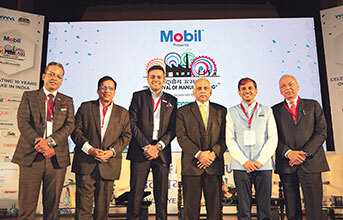
In a recent panel discussion on ‘Make in India 2.0: A CEO's Vision for the Next Decade,' held at the Festival of Manufacturing saw industry leaders sharing their perspectives on this enlightened journey.
Eminent panellists for the CEO panel, including Mahesh Gupta, CMD of Kent RO; Ramashankar Pandey, CEO of Tata Green Batteries; and Mihir V Shah, Executive Director & CFO of Vipul Organics Limited, shared their insights, strategies, and foresight for the next decade within the framework of the Make in India initiative under the moderation of Vinit Goenka, a former Spokesperson for BJP Delhi, Governing Council Member of CRIS, and Author.
Mahesh Gupta, CMD of Kent RO, shared his exquisite experience of being in the manufacturing industry for 35 years. He emphasised how the manufacturing sector has transformed in the past decade due to initiatives taken by Prime Minister, Shri Narendra Modi. The government's vision to bring about these positive reforms was the major highlight.
However, he also addressed the loopholes in the manufacturing sector such as the need for good quality products, which require urgent attention to surpass China. Additionally, Gupta discussed the potential for increased productivity through AI and automation to compete with market giants. He further highlighted the issue of water shortage due to contamination, citing it as a major cause for concern. According to him, impure water is one of the leading causes of cancer. Boiling water alone is not the solution to removing impurities, thus emphasising the necessity to purify water. He vouched for the reverse osmosis process, which helps purify water effectively, a technology adopted by Kent for water purification.
Ramashankar Pandey, CEO of Tata Green Batteries, discussed the necessity for a long-term vision to Make In India, emphasising the importance of starting car manufacturing within the country. Like Mahesh Gupta, he stressed the need for the manufacturing sector to be driven by productivity and innovation. Furthermore, the panel elaborated on how India needs to become sustainable by involving more people in the ecosystem. Attracting talent and building capacity are key to progress in the sector.
Moreover, Pandey highlighted how his initiatives have played a crucial role in solving societal problems such as road accidents. Hence, there is a need to connect a sense of purpose with the manufacturing sector to ensure the safety and security of citizens.
Mihir V Shah, Executive Director & CFO of Vipul Organics Limited, began by stating his passion for manufacturing. He emphasised how an increased standard of living will play an instrumental role in the sector's growth. Shah also highlighted the role of people in helping a company achieve formidable feats, stating that it goes beyond just having good products or infrastructure.
Furthermore, Shah discussed how his company invests most of its resources in scaling and R&D, noting that they go hand in hand. He also stressed the importance of upskilling, drawing a stark contrast between the IT sector and the manufacturing sector. He applauded the manufacturing sector's sense of job security, contrasting it with the thousands of layoffs often seen in the IT sector. In conclusion, the panellists highlighted how India can transform the manufacturing sector to emerge as a winner. Increasing exports is essential to significantly contribute to GDP growth. Additionally, they also emphasised sustainability and attracting new talent to the manufacturing sector for future progress.


























